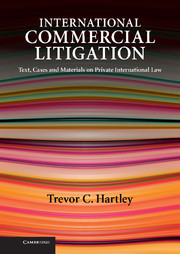Book contents
- Frontmatter
- Contents
- Table of panels
- List of figures
- Preface
- Acknowledgments
- Terminology
- Table of Latin phrases
- List of abbreviations
- Table of cases
- Table of cases (European Court of Justice, numerical order)
- Table of legislative instruments
- PART I STARTING OFF
- PART II JURISDICTION
- PART III FOREIGN JUDGMENTS
- 13 Introduction to Part III
- 14 EC law
- 15 English law: jurisdiction
- 16 English law: defences
- 17 The Canadian conflicts (judgments) revolution
- 18 US law: some highlights
- PART IV PROCEDURE
- PART V CHOICE OF LAW
- PART VI EXTRATERRITORIALITY
- Bibliography
- Index
15 - English law: jurisdiction
from PART III - FOREIGN JUDGMENTS
- Frontmatter
- Contents
- Table of panels
- List of figures
- Preface
- Acknowledgments
- Terminology
- Table of Latin phrases
- List of abbreviations
- Table of cases
- Table of cases (European Court of Justice, numerical order)
- Table of legislative instruments
- PART I STARTING OFF
- PART II JURISDICTION
- PART III FOREIGN JUDGMENTS
- 13 Introduction to Part III
- 14 EC law
- 15 English law: jurisdiction
- 16 English law: defences
- 17 The Canadian conflicts (judgments) revolution
- 18 US law: some highlights
- PART IV PROCEDURE
- PART V CHOICE OF LAW
- PART VI EXTRATERRITORIALITY
- Bibliography
- Index
Summary
The rules discussed in the previous chapter apply only to judgments from EC or Lugano States. Judgments from all other States are subject to the traditional rules of English law. In this chapter, after considering certain introductory matters, we discuss the traditional English rules in so far as they concern the jurisdiction of foreign courts. In the next chapter, we discuss various defences open to the defendant.
In England, the recognition and enforcement of foreign judgments originally depended solely on the common law. Today, there are various legislative provisions; nevertheless, the common law is still of great importance. We shall first consider the common law and then look at the legislation.
Theoretical basis for recognition and enforcement
English common law does not apply the comity theory (explained in Chapter 13, § 3, above). Reciprocity has never been required; nor is it necessary for there to be a treaty with the State of origin, though such treaties do exist. This fits in with the general tendency of the common law to give greater emphasis to the rights of the parties than to State interests – though the latter are not ignored.
English common law adopts the obligation theory. This was established in a series of cases in the nineteenth century. For example, in Williams v. Jones, Parke B said:
Where a court of competent jurisdiction has adjudicated a certain sum to be due from one person to another, a legal obligation arises to pay that sum, on which an action of debt to enforce the judgment may be maintained. […]
- Type
- Chapter
- Information
- International Commercial LitigationText, Cases and Materials on Private International Law, pp. 344 - 357Publisher: Cambridge University PressPrint publication year: 2009



